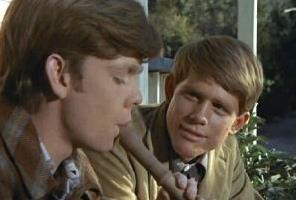“The Gift,” a recently repeated episode from the second season of The Waltons (seen in four-hour blocks Monday-Friday on Hallmark Channel) got me to thinking about the depiction of death in scripted television, which more often than not is a function of extreme violence and rarely explores the emotional and psychological aftermath of loss in a responsible way. There are notable exceptions – Alicia Florrick’s emotional retreat from reality following the murder of her sometime lover Will Gardner last season on CBS’ The Good Wife is one sterling example. Young Ephram Brown’s inability to find happiness following the death of his mother during the first season of Everwood is another.
Television writers seem largely incapable of dealing with death with true intelligence or insight, even though they work in a medium that all but revels in it. They could take a lesson from “The Gift,” which was first telecast decades ago on January 24, 1974.
“The Gift” is about a teenager named Seth (played by the one and only Ron Howard, post-The Andy Griffith Show and pre-Happy Days) who is diagnosed with leukemia and given only one year to live. The brilliant screenplay (by Earl Hamner Jr., Ray Goldrup, Jack Hanrahan and Carol Evan McKeand) handles death and the impending loss of one so young with a depth and sensitivity I can’t recall seeing on television in the 40 years since. I’m certain there were episodes of medical dramas (from Medical Center to St. Elsewhere to ER to Grey’s Anatomy) that broached the subject with similar profound dignity, but none of them come immediately to mind.
I remember watching “The Gift” when I was a kid and being somewhat shaken by it, probably because, at the time, I had never seen a story on television about a kid with a terminal illness, or the impact it was having on another kid -- the second eldest Walton son, Jason, someone I felt I knew because I watched The Waltons every week. Jon Walmsley, the actor who played Jason, hit every note perfectly, showing that, as a kid himself, he was unable to process what was happening to his friend. He withdrew from his family and from Seth, locking himself away in his room and playing his guitar in a way that can only be described as violent. At one point he broke down crying – something boys at the time were never supposed to do, on TV or in real life.

The story also explored Seth’s emotional reaction to his own mortality (Howard, left, with Walmsley, was outstanding), the responses of his mother (who was despondent) and father (who wanted to fill his son’s final year with a lifetime of good memories), the impact it had on John-Boy (who was clearly torn up inside but wouldn’t let his true emotions show because in typical John-Boy fashion he felt he had to remain strong for everyone else) and the quiet sadness of John and Olivia Walton, not only because close family friends were going through every parent’s worst nightmare but because it was tearing two of their own sons apart, as well.
There was a scene near the end of the episode in which wise old Grandpa Walton (the awesome Will Geer) sat with Jason and with great warmth, dignity and wisdom explained the hard realities of death to the boy. In my opinion it may have been the best treatment of this difficult subject I have ever seen. That meant a lot when I first saw the episode, but it means even more after another 40 years of TV viewing.
Just consider the treatment of death on television today. For reasons that should be disturbing to all, death is currently all the rage. Almost any television drama on broadcast, basic or pay cable or streaming services, reinforces this alarming observation. Movies, video games and comic books only add to the excitement.
I’m as guilty of supporting this escalating death wave as anyone else, and perhaps even more so, because as a television critic I tend to champion many shows that are saturated with violence, graphic bloodbaths and death, because they happen to be some of the best shows on TV. Given the number of dead bodies that turn up on scripted television almost nightly, and that really pile up when one binges certain shows, it is hard not to argue that in Hollywood, life is cheap.
Clearly, I’m giving this subject more thought than the average individual, but maybe that’s the point. What are television (and movie) writers (and video game creators) doing to us? What are we doing to ourselves by supporting some of television’s most violent programming in record numbers? Aren’t we all getting desensitized to such stuff, especially since so many of the deaths in most entertainment properties are “casual” or, in many shows, collateral damage?
Or maybe the real question should be, where are the Waltons when we need them?
This column was originally published in the Planet Ed blog at MediaBizBloggers.